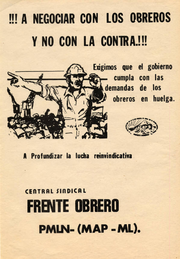
Frente Obrero
Encyclopedia

Nicaragua
Nicaragua is the largest country in the Central American American isthmus, bordered by Honduras to the north and Costa Rica to the south. The country is situated between 11 and 14 degrees north of the Equator in the Northern Hemisphere, which places it entirely within the tropics. The Pacific Ocean...
. FO was founded circa
Circa
Circa , usually abbreviated c. or ca. , means "approximately" in the English language, usually referring to a date...
1972-74, as the trade union wing of the pro-Albania
Hoxhaism
"Hoxhaism" is an informal term used to refer to a variant of anti-revisionist Marxism-Leninism that developed in the late 1970s due to a split in the Maoist movement, appearing after the ideological row between the Communist Party of China and the Party of Labour of Albania in 1978.The Albanians...
n MAP-ML.
When the National Reconstruction Government
Junta of National Reconstruction
The Junta of National Reconstruction officially ruled Nicaragua from July 1979 to January 1985, though effective power was in the hands of the Sandinista National Liberation Front's National Directorate....
was formed on July 19, 1979, FO had one of 33 representatives in the Council of State. As of 1983, it was mainly active in the construction and sugar cane sectors.
Adopting a hardline
Hardline
In politics, hardline refers to the doctrine, policy, and posturing of a government or political body as being absolutist and sometimes authoritarian. The hardline position is usually extremist and uncompromising....
, anti-revisionist
Anti-Revisionist
In the Marxist–Leninist movement, anti-revisionism refers to a doctrine which upholds the line of theory and practice associated with Karl Marx, Friedrich Engels, Vladimir Lenin and Joseph Stalin, and usually either Mao Zedong or Enver Hoxha as well...
policy on the Sandinistas
Sandinista National Liberation Front
The Sandinista National Liberation Front is a socialist political party in Nicaragua. Its members are called Sandinistas in both English and Spanish...
, starting in 1980 strikes led by the Front occurred in the private sugar mills of San Antonio and Monterrosa, while the Front called for 100% salary increases, started a series of occupations of privately-owned lands and industries, sabotaged government-led economic efforts, and advocated the development of "another civil war, this time against the Sandinista Front." Its base of support, however, gradually declined from thereon.
It was dissolved in 1986.

